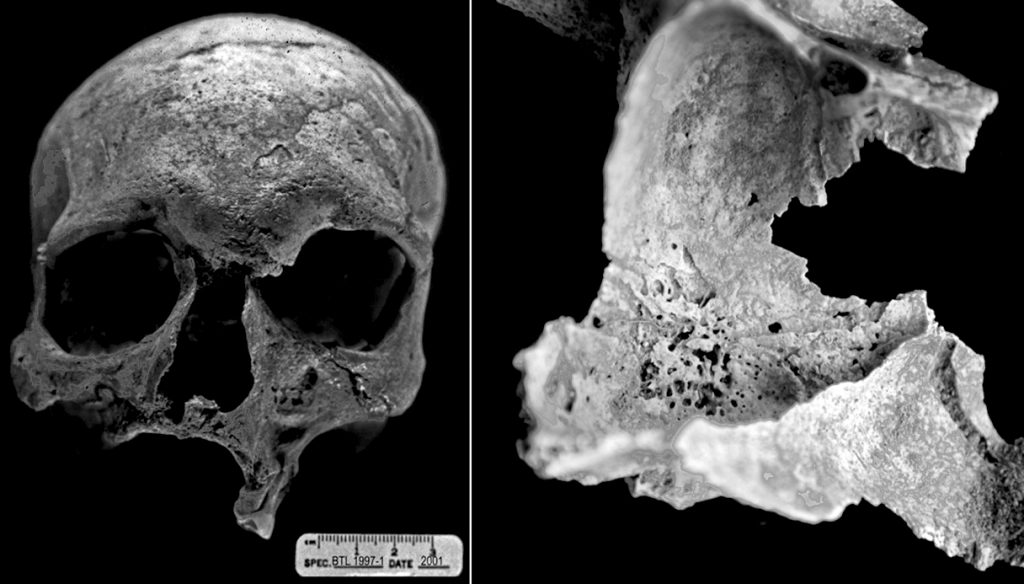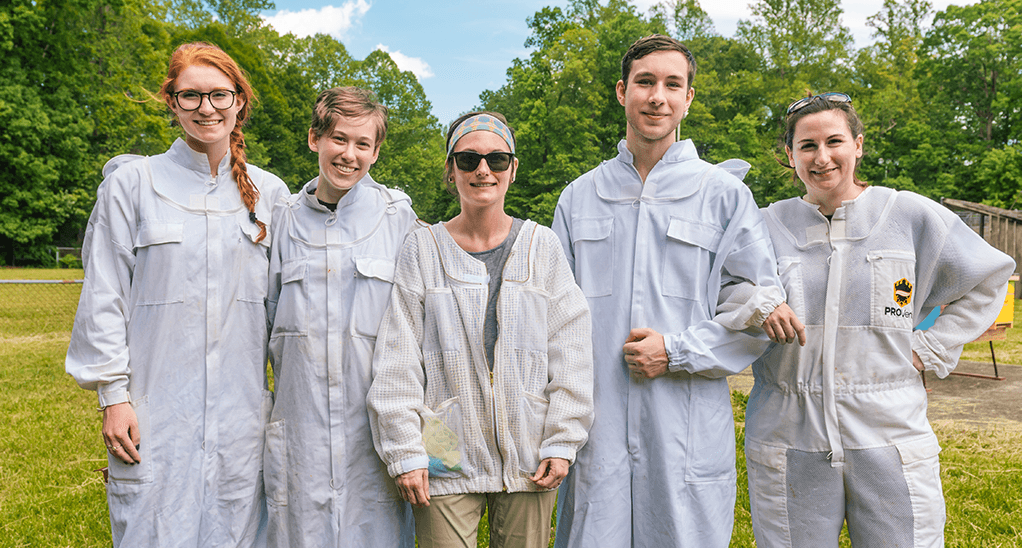
Research in Dr. Raymann’s lab encompasses evolution and genetics, microbiology, bioinformatics, and population dynamics … and research is never boring. During the winter months, lab members work on molecular protocols like DNA extractions, library preparations, DNA sequencing, and data analysis. When it’s warm, they are in the field beekeeping and performing experiments with honey bee hosts.
Graduate students in the Raymann Lab:
 As one of the first graduate students in Dr. Raymann’s lab, Megan Damico came to UNCG with bee gut microbes on the brain. For her dissertation work, Damico studies how strain-level bacterial communities are influenced by environmental and inherited factors using honey bees as a model system. Being in the Raymann lab has “been an incredible opportunity to learn about myself and my future career in science,” she says. Experimenting in the lab with bee gut bacteria and outside of the lab–exploring career paths independent of academic research–Damico landed on a career in science policy and advocacy, where she can use her technical expertise to be a voice for science in places that need it the most. “Dr. Raymann has been really supportive in helping me find the right career path that fits my interests. It’s been great to build my experience in science policy and advocacy and share them with the group.”
As one of the first graduate students in Dr. Raymann’s lab, Megan Damico came to UNCG with bee gut microbes on the brain. For her dissertation work, Damico studies how strain-level bacterial communities are influenced by environmental and inherited factors using honey bees as a model system. Being in the Raymann lab has “been an incredible opportunity to learn about myself and my future career in science,” she says. Experimenting in the lab with bee gut bacteria and outside of the lab–exploring career paths independent of academic research–Damico landed on a career in science policy and advocacy, where she can use her technical expertise to be a voice for science in places that need it the most. “Dr. Raymann has been really supportive in helping me find the right career path that fits my interests. It’s been great to build my experience in science policy and advocacy and share them with the group.”
 Lexi Hoopman, another PhD candidate who started in Dr. Raymann’s lab in 2018, studies how the most commonly used antibiotic in beekeeping affects the bee gut and reproductive microbes, as well as their overall reproductive function. “I am so thankful to Kasie for bringing me to North Carolina and UNCG, supporting my research goals, and for creating my ideal dissertation with me,” says Hoopman. Thanks to Dr. Raymann sharing her expertise in grant writing, Hoopman was awarded a USDA-NIFA-AFRI Predoctoral Fellowship to fund her dissertation. Additionally, Dr. Raymann was awarded a joint USDA grant with NC State University’s Dr. David Tarpy to further fund Hoopman’s research. After she graduates in 2024, Hoopman plans to continue in academia.
Lexi Hoopman, another PhD candidate who started in Dr. Raymann’s lab in 2018, studies how the most commonly used antibiotic in beekeeping affects the bee gut and reproductive microbes, as well as their overall reproductive function. “I am so thankful to Kasie for bringing me to North Carolina and UNCG, supporting my research goals, and for creating my ideal dissertation with me,” says Hoopman. Thanks to Dr. Raymann sharing her expertise in grant writing, Hoopman was awarded a USDA-NIFA-AFRI Predoctoral Fellowship to fund her dissertation. Additionally, Dr. Raymann was awarded a joint USDA grant with NC State University’s Dr. David Tarpy to further fund Hoopman’s research. After she graduates in 2024, Hoopman plans to continue in academia.
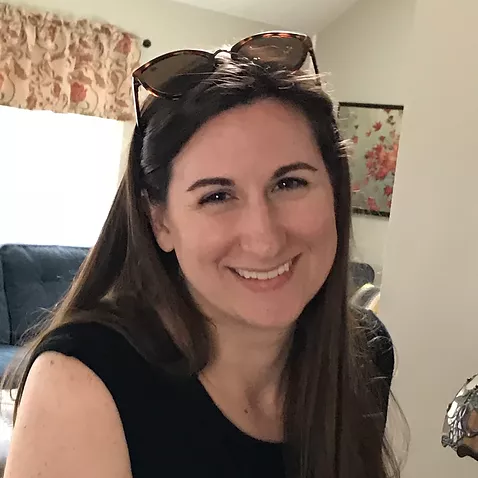 As an undergraduate researcher in Dr. Raymann’s lab, Heather Hopkins was unsure what career path to pursue with a degree in biotechnology. Despite interests in evolution, microbiology, and honey bees, she didn’t know how that could segue into a meaningful career. After working in Dr. Raymann’s lab, Hopkins was offered a Master’s project tailored to her interests: evolving an opportunistic pathogen and examining its effect on honey bee health. Three years later, she holds a Master’s degree and is the Raymann lab technician–where she continues her love for this research and lab.
As an undergraduate researcher in Dr. Raymann’s lab, Heather Hopkins was unsure what career path to pursue with a degree in biotechnology. Despite interests in evolution, microbiology, and honey bees, she didn’t know how that could segue into a meaningful career. After working in Dr. Raymann’s lab, Hopkins was offered a Master’s project tailored to her interests: evolving an opportunistic pathogen and examining its effect on honey bee health. Three years later, she holds a Master’s degree and is the Raymann lab technician–where she continues her love for this research and lab.
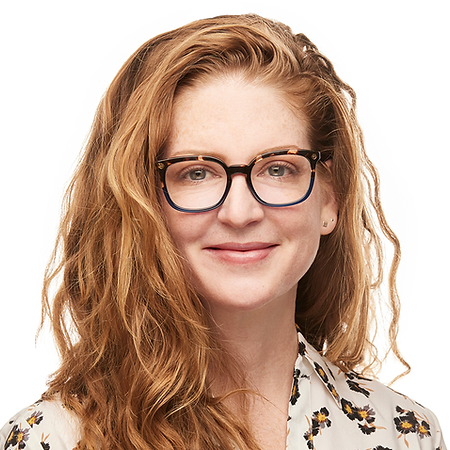 Carrie Stott is a second-year PhD student whose research uses the bee microbiome as a model to investigate the factors that shape bacterial adaptation, evolution, and speciation in host-associated gut communities. “I knew that after I received my Bachelor’s, I would want to continue my education, focusing on microbiology. Working with Dr. Raymann has been an awesome experience. She is an incredibly supportive and inspiring mentor and has provided so much invaluable insight in helping me to develop and achieve my goals.”
Carrie Stott is a second-year PhD student whose research uses the bee microbiome as a model to investigate the factors that shape bacterial adaptation, evolution, and speciation in host-associated gut communities. “I knew that after I received my Bachelor’s, I would want to continue my education, focusing on microbiology. Working with Dr. Raymann has been an awesome experience. She is an incredibly supportive and inspiring mentor and has provided so much invaluable insight in helping me to develop and achieve my goals.”
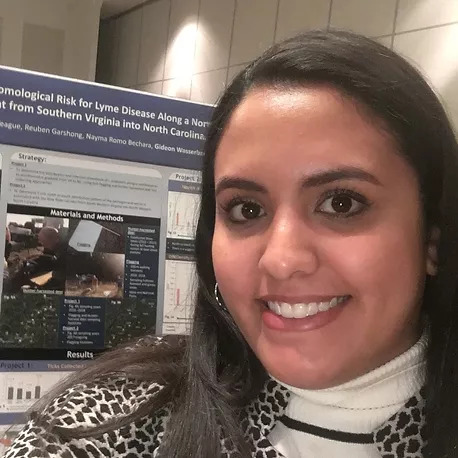 Starting as a master’s student in the Raymann lab three years ago, Nayma Romo Bechara’s project focused on changes in the bacterial communities of the sandfly’s rearing substrates. During her MS, Romo Bechara was mentored and guided by Raymann, who encouraged her to continue her studies and pursue a PhD. “Kasie has been an amazing mentor. She helped me realize that I want to further my studies in microbial evolution and stay in academia,” says Romo Bechara–now a first year PhD student in the lab.
Starting as a master’s student in the Raymann lab three years ago, Nayma Romo Bechara’s project focused on changes in the bacterial communities of the sandfly’s rearing substrates. During her MS, Romo Bechara was mentored and guided by Raymann, who encouraged her to continue her studies and pursue a PhD. “Kasie has been an amazing mentor. She helped me realize that I want to further my studies in microbial evolution and stay in academia,” says Romo Bechara–now a first year PhD student in the lab.
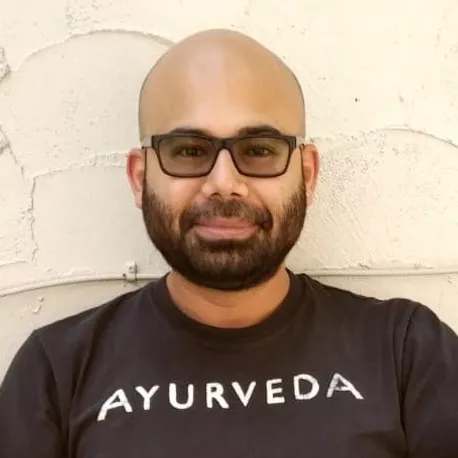 Shiva Thapa is also a first-year PhD student in the Raymann lab. He joined in the fall of 2021 to pursue his research interests, which lie at the intersection of microbial genomics and bioinformatics. Thapa’s current research focuses on understanding the factors that shape microbial community assembly and functional dynamics using honey bees as a model system. “Under Dr. Raymann’s mentorship, I have been able to not only develop and sharpen my research focus, but also enhance my teaching and professional skills. I feel lucky to have Dr. Raymann as my mentor, as she motivates me to follow my interests and grants me the freedom to explore beyond.”
Shiva Thapa is also a first-year PhD student in the Raymann lab. He joined in the fall of 2021 to pursue his research interests, which lie at the intersection of microbial genomics and bioinformatics. Thapa’s current research focuses on understanding the factors that shape microbial community assembly and functional dynamics using honey bees as a model system. “Under Dr. Raymann’s mentorship, I have been able to not only develop and sharpen my research focus, but also enhance my teaching and professional skills. I feel lucky to have Dr. Raymann as my mentor, as she motivates me to follow my interests and grants me the freedom to explore beyond.”
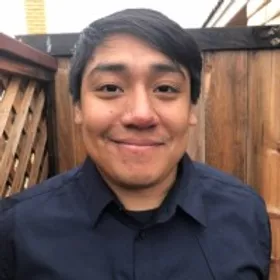 Christian Lopez Guerra, another first-year PhD student who joined in fall 2021, is here to further his passion for microbiology and evolutionary biology. His current research focuses on the role of predation on the evolution of opportunistic pathogens, using the honey bee as his model. “As a first-generation Mexican-American college graduate, I had very little knowledge of higher education. Dr. Raymann has been instrumental in providing me with extensive advice, guidance, and support. I am grateful to have her as a mentor as she continually helps me to develop as a student, as a teacher, and as a researcher. She helped me realize that I belong here.”
Christian Lopez Guerra, another first-year PhD student who joined in fall 2021, is here to further his passion for microbiology and evolutionary biology. His current research focuses on the role of predation on the evolution of opportunistic pathogens, using the honey bee as his model. “As a first-generation Mexican-American college graduate, I had very little knowledge of higher education. Dr. Raymann has been instrumental in providing me with extensive advice, guidance, and support. I am grateful to have her as a mentor as she continually helps me to develop as a student, as a teacher, and as a researcher. She helped me realize that I belong here.”




